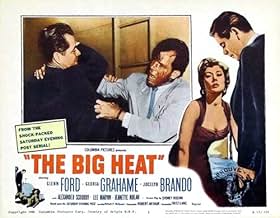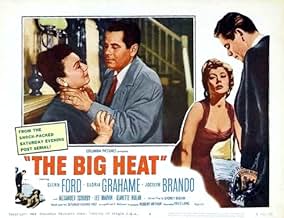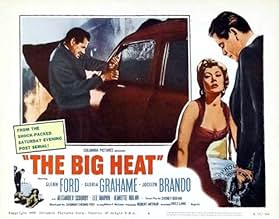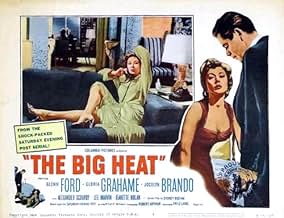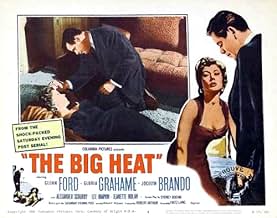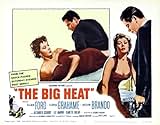VALUTAZIONE IMDb
7,9/10
31.271
LA TUA VALUTAZIONE
Il duro poliziotto Dave Bannion affronta un sindacato criminale politicamente potente.Il duro poliziotto Dave Bannion affronta un sindacato criminale politicamente potente.Il duro poliziotto Dave Bannion affronta un sindacato criminale politicamente potente.
- Regia
- Sceneggiatura
- Star
- Premi
- 2 vittorie e 2 candidature totali
Recensioni in evidenza
Coming full cycle, Hollywood seems to be back on the theme of good cop vs. bad cops controlled by the mob. Recently "16 Blocks" successfully pitted honest Bruce Willis against dishonest city hall. For a time, with "The Big Easy" being an early example, this type movie presented the image of a totally corrupt government from top to bottom with omnipresent mob ties indicating cynical times, even the one good cop being tainted, just not as much as others. "The Big Heat" is a prime example of this type film in the early Cold War period, emphasizing the importance of one good man standing up against all odds, in particular unconcerned citizens who either themselves become tainted or who are simply apathetic as long as they are left alone. "The Big Heat" like "High Noon" showed that the good must take a stand or the entire house will come crumbling down with the rodents taking over.
Glenn Ford was never a versatile actor. In the right role he could carry the load sufficiently to get by. In the wrong role, his acting was amateurish. That he had potential is indicated by his performances in two movies, "Gilda" and "The Big Heat." Arguably, his role as Det. Sgt. Dave Bannion is the better of the two. Perhaps it is the inimitable director Fritz Lang that prods Ford on to realize his true talents. There is no doubt that Ford makes Sgt. Bannion come alive and puts real flesh on his bones. Ford is so good in this film and in "Gilda" that he deserved more recognition than he got from the Hollywood big wigs.
The two shining performances are given by Gloria Grahame and Lee Marvin who run away with the show. They provide one of the legendary scenes in film history that just about everyone has either seen or read about, when Vince Stone (Marvin)--note the last name of Stone--pitches a container of boiling coffee into Debby Marsh's (Grahame) face, scarring her for life. Vince Stone's demise is also memorable. The coffee sequence alone is worth the price of admission.
Glenn Ford was never a versatile actor. In the right role he could carry the load sufficiently to get by. In the wrong role, his acting was amateurish. That he had potential is indicated by his performances in two movies, "Gilda" and "The Big Heat." Arguably, his role as Det. Sgt. Dave Bannion is the better of the two. Perhaps it is the inimitable director Fritz Lang that prods Ford on to realize his true talents. There is no doubt that Ford makes Sgt. Bannion come alive and puts real flesh on his bones. Ford is so good in this film and in "Gilda" that he deserved more recognition than he got from the Hollywood big wigs.
The two shining performances are given by Gloria Grahame and Lee Marvin who run away with the show. They provide one of the legendary scenes in film history that just about everyone has either seen or read about, when Vince Stone (Marvin)--note the last name of Stone--pitches a container of boiling coffee into Debby Marsh's (Grahame) face, scarring her for life. Vince Stone's demise is also memorable. The coffee sequence alone is worth the price of admission.
It's doubtful that even Dirty Harry in his most menacing moments could match the smouldering rage that Glenn Ford brings to the screen in this excellent 1953 Fritz Lang flick. From a modern POV there is nothing unfamiliar here, except maybe the dated hardboiled lingo. The maverick cop, the revenge theme, the underworld characters and heroines. It's just that whereas a modern director would make this into a predictable two hour yawn-fest with slow-motion car accidents and ten minute shootouts with shoulder-launched missiles, Lang's movie clocks in at under 90 minutes, and there isn't an ounce of fat on it. It's lean, fast-moving and engrossing. Not a single camera shot is wasted or unnecessary. The script crackles, the cast is uniformly excellent, and Ford and Lee Marvin in particular are unforgettably intense. Ford, just when he's about to go way over the top, reins himself in, adding to the aura of barely suppressed violence in his character.
The movie can also lurch from plot exposition to sudden, economical and unexpected explosions of violence which can still shock today and must have been extremely confronting fifty years ago. And from there it can become suddenly, unexpectedly sensitive and moving.
Nothing is wasted in this movie. Everything is nailed down just right. It's not that they don't make them like this any more; it's more that they've been making them like this ever since, and generally to lesser and lesser effect.
A strong 8 out of 10.
The movie can also lurch from plot exposition to sudden, economical and unexpected explosions of violence which can still shock today and must have been extremely confronting fifty years ago. And from there it can become suddenly, unexpectedly sensitive and moving.
Nothing is wasted in this movie. Everything is nailed down just right. It's not that they don't make them like this any more; it's more that they've been making them like this ever since, and generally to lesser and lesser effect.
A strong 8 out of 10.
This punchy little noir moves along at brisk clip. Glenn Ford simmers the whole time like a boiling kettle about to blow . This man has no pleasures that are obvious except his Westinghouse wife and child. Lee Marvin barely maintains control for much of the film. He is a catalogue of evil and greedy excess. Gloria Grahame is marvelous, witty, beautiful, bitter beyond hope. There is no redemption to be had for most of the characters in this sordid little universe. Conspiracy theorists of the 21st century will look back at the kind of simple-minded corrupt worldview espoused by Lang in this and other films and lament its loss. In THE BIG HEAT, evil and rot have names and faces and with enough fortitude, and the willingness to lose everything, they can be conquered. At least for a day. We know today that the whole infrastructure of power is poisoned beyond repair. The fifties held out a modicum of hope. Brief, fleeting hope. This is a violent film. Others have commented that much of the horror is committed off screen. But you can easily imagine it. Lang doesn't pull many punches here. The treadmill of denouement speeds up rapidly in the last few sections of the film. After viewing a film like THE BIG HEAT, I often want to wander down some dark street and find a corner diner, something like the one portrayed in Hoppers's NIGHTHAWKS, and have a cup of java, listen to some Brubeck on the jukebox, and wait for someone to come in from the chilly street . But the diners in my neighbourhood are either in the middle of the block or close early because of street crime. So I stay home, have a cup of tea, and dream noirish thoughts half asleep on my couch. This is a fine entry into the film noir lexicon.
Glenn Ford is a police sergeant seeking retribution for the death of his wife in "The Big Heat," a 1953 film that also stars Gloria Graham and Lee Marvin. While investigating a police officer's alleged suicide, Ford's idyllic family life is ruptured when his lovely young wife is killed in a car bombing intended for him. Some have suggested the similar scene in "The Godfather" was inspired by "The Big Heat." It's certainly possible.
For 1953, the violence is uncompromising, particularly against the female character played by Gloria Graham when she crosses her boyfriend, Lee Marvin, in one of his early roles. Marvin is fantastic as a brute, and this characterization must have done a lot to raise his profile in films.
There are some outstanding performances, including that of Jeannette Nolan as the late officer's wife who knows plenty. Glenn Ford, a handsome, solid actor who seems forgotten now, underplays his role but the coldness and rage he feels is evident as he goes from happy family man to angry avenger.
Excellently directed by Fritz Lang, "The Big Heat" packs a wallop.
For 1953, the violence is uncompromising, particularly against the female character played by Gloria Graham when she crosses her boyfriend, Lee Marvin, in one of his early roles. Marvin is fantastic as a brute, and this characterization must have done a lot to raise his profile in films.
There are some outstanding performances, including that of Jeannette Nolan as the late officer's wife who knows plenty. Glenn Ford, a handsome, solid actor who seems forgotten now, underplays his role but the coldness and rage he feels is evident as he goes from happy family man to angry avenger.
Excellently directed by Fritz Lang, "The Big Heat" packs a wallop.
A violent story about a detective working in a corrupt department who investigates the apparent suicide of a fellow officer. Worth seeing for Glenn Ford's prototypical performance and Gloria Grahme's show stealing portrayal of a boozing moll with a conscience. With facial disfigurement and cigarette burns it took violence up a notch from the standard gun play of the past, making it grimmer and more realistic, and giving the story more punch. Grahme's tough and tender role stands out and gives the film a tragic element, while certain of its portrayals of greed and corruption (namely the dead officer's wife) stand out for their attention to detail. In the end, it IS the details that give this formulaic story its clout, and we can thank director Fritz Lang for that.
Lo sapevi?
- QuizColumbia wanted to borrow Marilyn Monroe from 20th Century-Fox to play the role of Debby Marsh, but Fox's asking price was too high. Gloria Grahame was cast instead.
- BlooperThe street address for the junkyard on Bannion's list is "101", yet the number "1024" is seen on a large sign over the yard's shed.
- Citazioni
Debby Marsh: [to Bannion] Oh, well, you're about as romantic as a pair of handcuffs.
- ConnessioniFeatured in Mean Streets - Domenica in chiesa, lunedì all'inferno (1973)
- Colonne sonoreIt's a Blue World
(uncredited)
Written by Chet Forrest and Bob Wright
Heard instrumentally during one of the scenes at The Retreat
I più visti
Accedi per valutare e creare un elenco di titoli salvati per ottenere consigli personalizzati
Dettagli
- Data di uscita
- Paese di origine
- Lingua
- Celebre anche come
- Io, la legge
- Luoghi delle riprese
- Azienda produttrice
- Vedi altri crediti dell’azienda su IMDbPro
Botteghino
- Lordo in tutto il mondo
- 7083 USD
- Tempo di esecuzione1 ora 29 minuti
- Colore
- Proporzioni
- 1.37 : 1
Contribuisci a questa pagina
Suggerisci una modifica o aggiungi i contenuti mancanti



